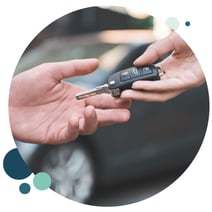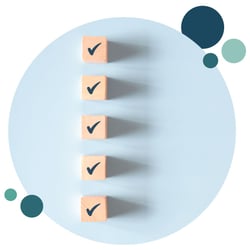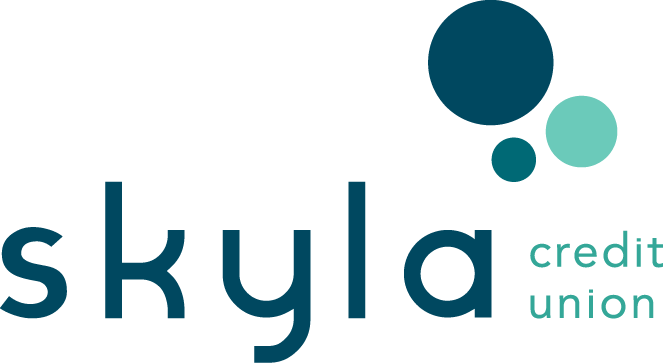How Do I Buy a Car From a Private Seller?
Buying a car from a private seller can be a scary and nerve-wracking process simply because, as the buyer, you have to do most of the work. Unlike dealerships, the seller won’t offer coverage for the car they’re selling and the sale is final. It's up to you as the buyer to ensure the seller is keeping up his or her end of the deal in selling a trustworthy car.
 But there’s good news! Just because there's a certain process to follow when buying from a private seller doesn't mean it has to be hard or confusing.
But there’s good news! Just because there's a certain process to follow when buying from a private seller doesn't mean it has to be hard or confusing.
In this article, I’ll eliminate the guesswork and point out exactly what you need to do so the process of buying from a private seller is easy. I'll also share the tips we provide our credit union members when they’re in your shoes so you have the insider scoop!
what you'll need to know to buy a car from a private seller:
 what are the advantages of buying a car from a private seller?
what are the advantages of buying a car from a private seller?
- The Car Costs Less: You can expect to save more money buying a used car from a private seller than at a dealership. Dealerships are known for marking up the value of the car and adding on fees for overhead and operational costs, insurance, advertising, and more. Even though the private seller is also trying to make a profit, they won’t have any of those extra fees associated with the purchase.
- You Have Bargaining Power: Private sellers don’t spend their days selling cars as a regular car salesman does, so they may be willing to negotiate a lower price that works for you. Plus, since the car is used there may be damage or wear and tear that can help lower its price.
Psst… make sure you check the car’s history by getting a history report using sites like Carfax and Autocheck. You can also learn the private seller value of a car by checking Kelly Blue Book and usedcars.com. This knowledge gives you negotiating power in case the car is priced higher than it should be. |
- A Private Seller Can Provide the Car's History: Unlike dealerships, the private seller knows their car's ins and outs because they’ve owned it for some time. They can thoroughly describe the condition of their car, which is always a plus!
QUICK TIP: Don’t solely rely on the private seller's knowledge of the condition of their car. If you proceed further with the private seller, make sure you get the car inspected by a mechanic before you buy. If possible, request the selling price of the car be contingent upon any repairs that may be needed or if the car passes inspection. |
 what are the disadvantages of buying a car from a private seller?
what are the disadvantages of buying a car from a private seller?
- You Have to do More Footwork: When buying a car, a lot of research and planning is involved. At the dealership, the dealer handles a huge chunk of that work for you. For example, they have mechanics on-site to ensure the car is in the best shape, they know the ins and outs of the model car you’re looking at, and they have experience with the final sale of a car. When buying from a private seller, you’re doing all of that work yourself. You’re researching the car and the seller to buy from to ensure they are legit. You also have to find a trusted mechanic to inspect the vehicle before buying, and you and the private seller are responsible for the paperwork.
- You Run the Risk of Buying a Defective Car: It’s possible to come across a defective car for sale that needs repair work from the mechanic, including a vehicle safety inspection. A vehicle safety inspection generally includes an emissions inspection that detects the level of pollutants emitted from a vehicle's exhaust. According to emissions.org, “The State of North Carolina requires vehicle emissions tests for vehicles registered in 48 counties”. (That's 7,500 inspection stations in the state!)
what's an emissions test?
An emissions test determines the level of air pollutants emitted from the vehicle's exhaust. This includes hydrocarbons, oxygen, carbon monoxide, and nitrogen oxides present in the vehicle exhaust.
- You're Responsible for Repairs: When buying from a private seller, you’re taking the risk of buying a used car “as is” so if there are any issues, it’s your responsibility to fix any car problems that pop up. You can certainly negotiate a deal with the seller where they can give you credit towards repairs, or the sale in contingent on the car passing inspection, but not every seller will be flexible.
- The Sale is Final: Dealerships allow buyers to cancel and return the car before a certain number of days if they’re unhappy with the vehicle. The chances of a private seller doing that are very slim. Once you pay the private seller and the title is signed, the purchase is final. Unfortunately, there's "I changed my mind."
 what to do i need to do before buying from a private seller?
what to do i need to do before buying from a private seller?
In this process, it’s important you make the right moves in finding a used car you like and is in excellent condition before paying the seller. Here’s what you’ll need to do to get started:
- Research, Research, Research: I cannot stress enough how much research you need to do when finding a used car. Don’t rush into buying a car and take the time to get all the information you need.
- Comb Through Ads: When finding a used car, keep in mind that it’ll have road experience, so try to investigate the car's past. Make sure the description of the vehicle is detailed, and, if you’re on sites like Facebook Marketplace, Craigslist, or Cargurus, pay close attention to the vehicle description. It’s a good sign if you see a full description of the car, including the year, make, model, and mileage. Bonus points if there’s info about the car being completely paid off. Psst… You may want to steer clear of blank ads listed on sites like Facebook Marketplace because it may be a scam.
As you’re combing through ads for cars you like, also use sites like Kelly Blue Book to get an idea of the car’s fair market value that way you can tell if the seller's price is accurate.
|
- Contact the Seller: If you find a car you like and you're ready to move forward, then it's time to call the seller! You can start the conversation by confirming the car information that's listed in the ad and asking any concerning questions that you may have like repairs, car history, and any other information that may have been missing. If everything sounds good, then it's time to schedule a test drive.
- Meet and Test Drive the Car: When you meet the seller, make sure you're in an open area that's well-lit. Before you get behind the wheel, make sure to really check the car out. Be on the lookout for:

- Any dents or scratches on the outside of the car
- Rust - check the wheels and doors for rust or raised paint. which means rust has been painted over
- Working headlights and taillights
- Working windshield wipers
- Functioning locks
- Run the air conditioner and heat for a few minutes to tell if they work properly
- Play with the radio, Bluetooth, USB, and auxiliary ports
When it's time to test drive the vehicle, drive it for more than 15 minutes. Also, drive on both streets and highways to get a feel for how the car rides at different speeds. Listen for any noises when your foot is on the gas or pressing on the breaks and pay close attention to the steering wheel. If you need to adjust it more than once, it's time to get the steering wheel aligned.
 what questions should i ask a seller?
what questions should i ask a seller?
When you contact the seller by phone or meet in person, it's always helpful to have a list of questions to ask to ensure you're getting a good car. Here are a few recommended questions to ask:
Why are you selling the car? |
 its time to make a deal - here's what to expect
its time to make a deal - here's what to expect
If everything is looking good and you're ready to purchase, it's time to buy! Before you do, make sure you and the seller have agreed on the price and have determined the method of payment. Also, make sure you have all of the necessary paperwork ready to roll:
 Have the title certificate signed by both the buyer and seller and notarized. The completed title officially transfers car ownership to you
Have the title certificate signed by both the buyer and seller and notarized. The completed title officially transfers car ownership to you- Have your auto insurance in place
- Request a copy of the bill of sale that's completed and signed by both you and the seller. Contact your local DMV to ensure you have all the necessary documents to complete the sale
Once the DMV has all of the documents including taxes and fees paid. The seller removes the current license plate and replaces it with yours and it's official. You're a new car owner!
 can i buy a car from a private seller with a loan?
can i buy a car from a private seller with a loan?
Absolutely! Not everyone can pay for a car in full, which includes buying from a private seller too. At Skyla, we offer financing if you’re interested in buying from a private party however both parties need to be present at the credit union for identification purposes. Being physically present at a branch eliminates a common red flag when buying from a private party - buying a car sight unseen.
Once you’ve done the steps above, you and the seller will need to both meet at the credit union to process your auto loan and pay for the vehicle. While at the branch, you’ll also pay any DMV fees. (Psst… if the seller owns the car outright and doesn’t have any liens on the vehicle, they’ll need to be the title with them to closing)
QUICK TIP: If the car is financed and the loan isn't paid off, we require the seller to prove a payoff statement so the check gets sent to the lienholder. This process can take longer because our loan officers need to wait for the title to arrive to our offices before processing it at the DMV for you. |
WHAT DOCUMENTS ARE NEEDED WHEN FINANCING A PRIVATE SALE CAR?
It’s important for both the buyer and the seller to have the necessary documents with them to help make this process as smooth as possible. Documents include:
- Title Certificate (Reverse side has been signed by the Buyer & Seller and has been notarized )
- Bill of Sale (Completed and signed by both the Buyer and Seller)
- As the buyer, you need to provide proof of insurance
- The buyer must also have a valid Driver's License
QUICK TIP: When members choose Skyla to finance their car, they have protection benefits such as mechanical repair coverage, guaranteed asset protection (GAP), and credit insurance protection. See how these additional benefits can keep your ride protected. |
 what are the red flags to buying a car from a private seller?
what are the red flags to buying a car from a private seller?
- The Seller is Pushy or Questionable: When communicating with a seller, make sure they’re willing to show you the car in person. If the seller gives you a hard time and is not willing to meet you in person - walk away! And, make sure to pay attention to how they make you feel. If you feel uncomfortable with the sale, don't go any further and walk away!
- The Car is Priced Below Market Value: I know it sounds like a great deal, but if this is the case, then it's possible something is actually wrong with the car. Make sure you get all your questions answered and take the car to the mechanic to get it looked at before purchasing the vehicle. Talk to the seller and see if buying the car can be contingent on the vehicle passing inspection. That way you're not putting yourself at risk buying a car that could need repairs down the line.
- They’re Missing Documents and Salvaged Title: If the seller is missing documents, most importantly the title to the car - don't go any further with the seller. Without the title, the seller has no proof they own the car. The owner of the vehicle can order a duplicate title in case it has been lost or never received but they must contact their local DMV to take the steps of replacing it.
- Too Many Part Recalls: When a car part gets recalled, that means the part is dysfunctional and can be dangerous. Do your homework and research as much information about the car as possible because that seller may be selling the car for safety reasons.
- Buying a Car Sight Unseen: Never pay for a car that you've never physically seen or driven. There are untrustworthy sellers looking to make a quick buck and will lie about a car and offer a fake inspection to convince you that they are trustworthy. Don't do it!
here's what's next
Phew… I know that felt like a lot but the more you know about buying a car from a private seller, the better off you'll be. Private sellers generally sell their cars "as is" and the sale is final so make sure you feel comfortable with the sale. Also, if you feel rushed into making a sale, don't feel bad for walking away. Pushy and questionable sellers may have something to hide or might be selling a defective car.
If you're ready to start searching for cars sold by private sellers here are some links that will get you going - Kelly Blue Book, usedcars.com, Facebook Marketplace, and Cargurus.
think you'll need help with financing a car?
Our Customer Service Representatives are here for you and ready to assist! You can send an email, give us a call at 704.375.0183, or visit any of our branches.
As Content Strategist behind the Learning & Guidance Center, Yanna loves showing just how doable finance can be. Whether it’s simple tips, step-by-step guides, or comparison charts, she’s passionate about helping readers take charge and reach financial freedom with confidence
more resources to get you ready to roll
The Pros and Cons of Getting Pre-Qualified for an Auto Loan
Want to know the pros and cons of getting pre-qualified for an auto loan? Learn how prequalifying can benefit you before officially applying for an auto loan and more.
10 min. read
A Comparison of Auto Loan Options
Need an honest comparison between the different auto loan options for your perfect car? Here you’ll be able to identify auto loan types, how auto loans work, where to shop for auto loans and more.
13 min. read
 how to buy from a private seller
how to buy from a private seller
Don’t know where to begin when buying a used car from a private seller? Here's how you can ensure your car buying process is as smooth as possible.
 determine your costs
determine your costs
Understand the upfront, monthly, and occasional costs associated with an auto loan.
 figure out what credit score is needed
figure out what credit score is needed
Find out the score you need, how your credit score is calculated, and more.


